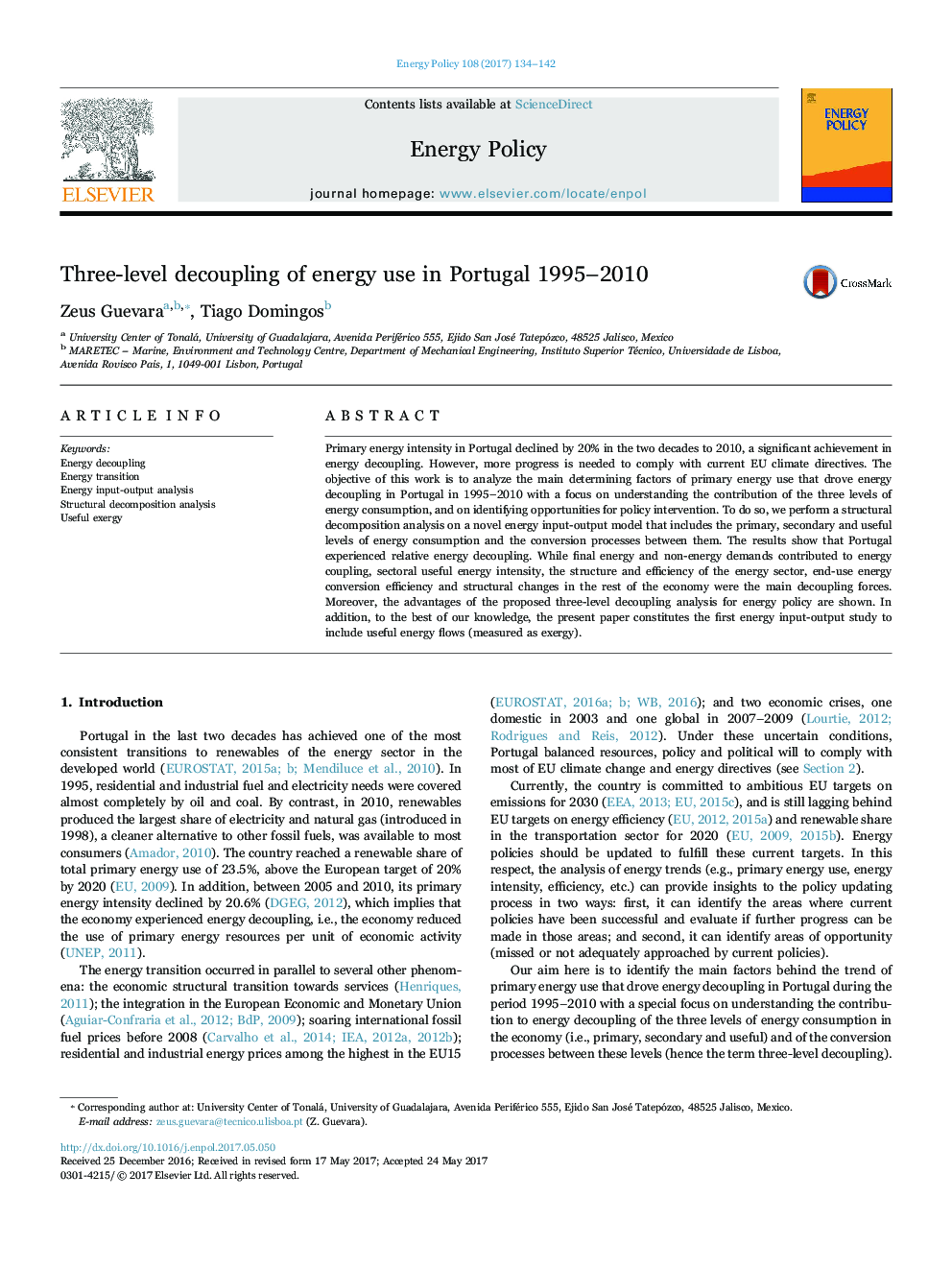| کد مقاله | کد نشریه | سال انتشار | مقاله انگلیسی | نسخه تمام متن |
|---|---|---|---|---|
| 5105641 | 1481250 | 2017 | 9 صفحه PDF | دانلود رایگان |
عنوان انگلیسی مقاله ISI
Three-level decoupling of energy use in Portugal 1995-2010
ترجمه فارسی عنوان
جدا کردن سه سطح مصرف انرژی در پرتغال 1995-2010
دانلود مقاله + سفارش ترجمه
دانلود مقاله ISI انگلیسی
رایگان برای ایرانیان
کلمات کلیدی
جداسازی انرژی، انتقال انرژی، تجزیه و تحلیل ورودی-خروجی انرژی، تجزیه تجزیه ساختاری، اگزرژی مفید،
ترجمه چکیده
شدت انرژی ابتدایی در پرتغال در دو دهه گذشته تا سال 2010 20 درصد کاهش یافته است، دستاورد قابل توجهی در جداسازی انرژی است. با این حال، پیشرفت بیشتری برای رعایت دستورالعمل های فعلی اتحادیه اروپا در مورد آب و هوا لازم است. هدف از این کار تجزیه و تحلیل عوامل تعیین کننده اصلی استفاده از انرژی اولیه است که تفکیک انرژی را در پرتغال در سال های 1995 تا 2010 با تمرکز بر درک سهم سه سطح مصرف انرژی و شناسایی فرصت های مداخله در سیاست، انجام داد. برای انجام این کار، تجزیه و تحلیل تجزیه ساختاری بر روی یک مدل جدید ورودی-خروجی انرژی که شامل سطوح اولیه، ثانویه و مفید مصرف انرژی و فرایندهای تبدیل بین آنها است، انجام می شود. نتایج نشان می دهد که پرتغال انرژی جداگانه انرژی نسبی را تجربه می کند. در حالیکه تقاضای نهایی انرژی و غیر انرژی به اتصال انرژی کمک می کرد، شدت انرژی مفید بخش ها، ساختار و کارایی بخش انرژی، بازده تبدیل تبدیل انرژی پایدار و تغییرات ساختاری در سایر نقاط اقتصاد نیروهای جداسازی اصلی بود. علاوه بر این، مزایای تجزیه و تحلیل تجزیه سه سطح پیشنهاد شده برای سیاست انرژی نشان داده شده است. علاوه بر این، به خوبی از دانش ما، این مقاله اولین مطالعه انرژی ورودی-خروجی انرژی است که شامل جریان انرژی مفید (اندازه گیری شده به عنوان اگزرژی) است.
موضوعات مرتبط
مهندسی و علوم پایه
مهندسی انرژی
مهندسی انرژی و فناوری های برق
چکیده انگلیسی
Primary energy intensity in Portugal declined by 20% in the two decades to 2010, a significant achievement in energy decoupling. However, more progress is needed to comply with current EU climate directives. The objective of this work is to analyze the main determining factors of primary energy use that drove energy decoupling in Portugal in 1995-2010 with a focus on understanding the contribution of the three levels of energy consumption, and on identifying opportunities for policy intervention. To do so, we perform a structural decomposition analysis on a novel energy input-output model that includes the primary, secondary and useful levels of energy consumption and the conversion processes between them. The results show that Portugal experienced relative energy decoupling. While final energy and non-energy demands contributed to energy coupling, sectoral useful energy intensity, the structure and efficiency of the energy sector, end-use energy conversion efficiency and structural changes in the rest of the economy were the main decoupling forces. Moreover, the advantages of the proposed three-level decoupling analysis for energy policy are shown. In addition, to the best of our knowledge, the present paper constitutes the first energy input-output study to include useful energy flows (measured as exergy).
ناشر
Database: Elsevier - ScienceDirect (ساینس دایرکت)
Journal: Energy Policy - Volume 108, September 2017, Pages 134-142
Journal: Energy Policy - Volume 108, September 2017, Pages 134-142
نویسندگان
Zeus Guevara, Tiago Domingos,
